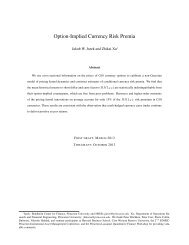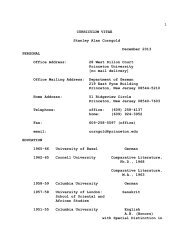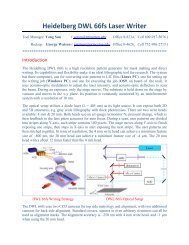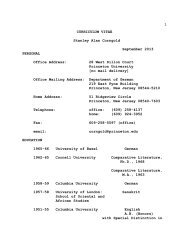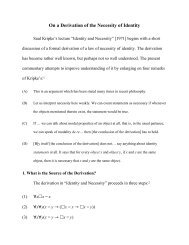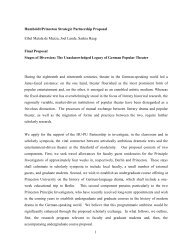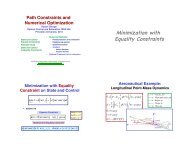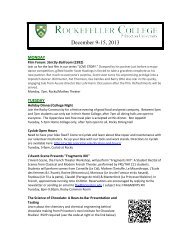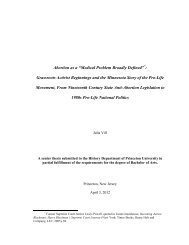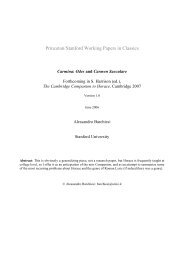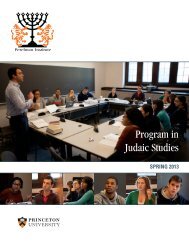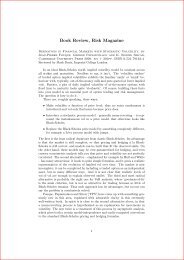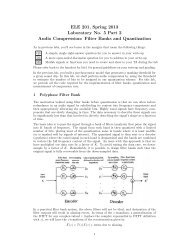Campaign residen the P -litics - Princeton University
Campaign residen the P -litics - Princeton University
Campaign residen the P -litics - Princeton University
Create successful ePaper yourself
Turn your PDF publications into a flip-book with our unique Google optimized e-Paper software.
Professor Sarah-Jane Leslie *07<br />
really were terrorists. What prejudice did that spawn? How<br />
do we understand and combat it?”<br />
Joshua Knobe’s best-known contribution to experimental<br />
philosophy also is related to issues of blame, going back to a<br />
survey he conducted in New York City’s Washington Square<br />
Park. It was a question of intentionality, based on <strong>the</strong> following<br />
scenario: A proposed new product will increase profits,<br />
but at <strong>the</strong> cost of harming <strong>the</strong> environment. Declaring that<br />
he cares about money and not <strong>the</strong> environment, <strong>the</strong> head of<br />
a company gives <strong>the</strong> go-ahead to make <strong>the</strong> product. As<br />
expected, profits rise, as does environmental damage. So<br />
Knobe asked survey respondents if <strong>the</strong> executive was to<br />
blame for harm to <strong>the</strong> environment, and 82 percent said yes.<br />
Now imagine <strong>the</strong> same scenario, with one key difference:<br />
The new product helps ra<strong>the</strong>r than hurts <strong>the</strong> environment.<br />
The executive still cares just about profits, so <strong>the</strong> new product<br />
goes forward and <strong>the</strong> money rolls in. But when asked if<br />
<strong>the</strong> executive had helped <strong>the</strong> environment, only 23 percent<br />
of Knobe’s respondents gave him credit for that.<br />
Thus was born <strong>the</strong> “Knobe effect,” which summarizes that<br />
people are moralizing creatures who are far more likely to<br />
assign blame for bad things than credit for good things.<br />
Knobe has done fur<strong>the</strong>r research delving into questions of<br />
free will, determinism, and <strong>the</strong> philosophical processes that<br />
are involved in triggering emotional versus rational responses<br />
when it comes to passing judgment.<br />
The Knobe effect, which he uncovered while still a graduate<br />
student at <strong>Princeton</strong>, frequently is referenced in election<br />
years to explain <strong>the</strong> effectiveness of negative political advertising.<br />
It also made Knobe a star and one of experimental<br />
philosophy’s most visible figures. He is writing a book about<br />
experimental philosophy that he hopes will evoke <strong>the</strong> image<br />
of an armchair going up in flames.<br />
Not everyone is convinced. “If you had put this to philoso-<br />
phers before <strong>the</strong> advent of experimental philosophy, you<br />
would have seen this same contrast,” Gideon Rosen says.<br />
“Sure, you can go out and do surveys to confirm it. But those<br />
intuitions are interesting and available without doing surveys.<br />
Even if Knobe had never done an experiment in his<br />
life, he could have written a paper about this with <strong>the</strong> same<br />
significance. My hunch is that philosophers are good at<br />
channeling <strong>the</strong> judgments ordinary people would make.”<br />
Maybe, maybe not. Anthony Appiah, who was one of<br />
Knobe’s dissertation readers at <strong>Princeton</strong>, thinks that such<br />
surveys can only enhance <strong>the</strong> process of philosophy.<br />
“The question isn’t if you could come to <strong>the</strong> same conclusion<br />
without experiments,” says Appiah, “but do <strong>the</strong> experiments<br />
move us ahead in different ways or faster than sitting<br />
around reflecting? I think it would be hard to argue this<br />
hasn’t helped stimulate new questions. The test will be 10<br />
years from now, what we’ve learned by <strong>the</strong>n.”<br />
Ano<strong>the</strong>r common attack on<br />
experimental philosophy is that because most experiments<br />
involve asking <strong>the</strong> opinions of people not trained in philosophical<br />
thinking, <strong>the</strong> results are not valid. It’s “folk philosophy,”<br />
what ordinary people think of as philosophy, ra<strong>the</strong>r<br />
than <strong>the</strong> real thing.<br />
“[In] some of <strong>the</strong>se surveys, it’s unclear why <strong>the</strong> results are<br />
relevant to philosophy,” Rosen says. “So why jump through<br />
hoops? Why not just discuss substantive questions of right<br />
and wrong with people who have been trained to think<br />
about hard cases?” Nonsense, says Stich.<br />
“The whole ‘expertise defense’ [of armchair philosophy] says<br />
it doesn’t matter what <strong>the</strong> man on <strong>the</strong> street thinks about<br />
intuitive knowledge, moral permissibility, or intentionality,<br />
because he’s not an expert,” Stich says. “Philosophers claim to<br />
be <strong>the</strong> only experts capable of producing philosophical intuitions.<br />
But are <strong>the</strong>y? Do you have to have six years of graduate<br />
training at a prestige university to be philosophically savvy?”<br />
In recent years, Stich has been doing survey experiments<br />
to see if philosophers have systematically different intuitions<br />
from ordinary people (which conceivably would render professional<br />
philosophers’ judgments less universal than <strong>the</strong><br />
discipline claims). Early indications are that <strong>the</strong>y do, Stich<br />
says. But while those philosophers’ “right” intuitions might<br />
win over similarly minded peers on a tenure committee,<br />
does that give <strong>the</strong>m <strong>the</strong> weight of inherent truth? Experi -<br />
mental philosophy amounts to a generation saying, not so<br />
fast. Ultimately, <strong>the</strong> debate seems to come down to who<br />
owns philosophy and even truth — a closed society of<br />
experts, or everyone?<br />
“Truth does not belong to philosophy but to all of us,” says<br />
Appiah. “How ordinary people use it is part of <strong>the</strong> accounting,<br />
even if <strong>the</strong>y’re deploying it in ways that may be slippery<br />
and incoherent. Language and <strong>the</strong> mind are both messy, and<br />
so is <strong>the</strong> world.<br />
“Reality,” Appiah says, “is never tidy.” π<br />
David Menconi is a music critic and feature writer at <strong>the</strong> News<br />
& Observer in Raleigh, N.C.<br />
paw.princeton.edu • May 16, 2012 <strong>Princeton</strong> Alumni Weekly<br />
P<br />
39



